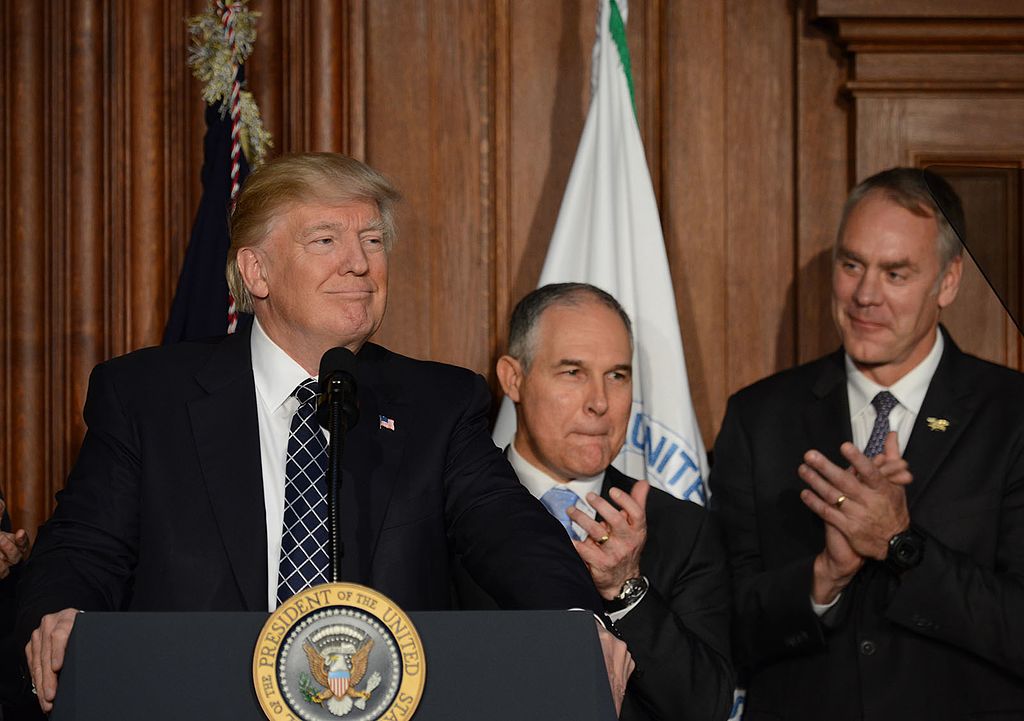The first year of Donald Trump’s presidency has seen a measurable difference in the way the U.S. Environmental Protection Agency (EPA) has been holding polluters accountable compared to the past 25 years. Under Scott Pruitt, the EPA has collected, on average, 49 percent less in civil penalties against violators of federal environmental laws than in the first year of the previous three administrations, according to a new report from the nonprofit Environmental Integrity Project.
“President Trump’s dismantling of the EPA means violators are less likely to be caught, making illegal pollution cheaper,” said Eric Schaeffer, executive director of the Environmental Integrity Project and former director of EPA’s Office of Civil Enforcement. “The president’s ‘law and order’ agenda apparently wasn’t intended for fossil fuel companies and other big polluters.”
Between January 20, 2017 and January 20, 2018, Trump’s EPA lodged 48 civil cases and fined polluters $30 million, excluding Superfund and criminal cases. When the numbers for previous administrations are adjusted for inflation, the difference becomes even more stark. Under Trump, polluters paid fines 57 to 68 percent lower than those under previous administrations.
Credit: Environmental Integrity Project report, “Paying Less to Pollute: A Year of Environmental Enforcement Under the Trump Adminstration.”
Because these types of cases take months or years to resolve, many of the cases settled under Trump were initially undertaken during the Obama administration. Yet that would still be the situation for the first year of other administrations.
“You’re not seeing fewer enforcement actions because there are fewer violations out there to find,” Schaeffer said. His organization found that, as of November 2016 when it filed an open records request, the EPA had sent more than 1,600 notices of pollution violations to companies.
Judith Enck, former EPA administrator for Region 2 (New York, New Jersey, and Puerto Rico), agreed with the conclusions of the Environmental Integrity Project report.
“Weak enforcement has real life consequences for American families and workers,” said Enck.
Enck points to one example in which the Trump administration seems to be affecting how EPA holds polluters accountable for environmental and health violations. On two separate occasions, the EPA found that Syngenta Seeds, a subsidiary of Syngenta AG, caused farmworkers on the Hawaiian island of Kauai to be exposed to a dangerous insecticide.
In December 2016, EPA announced it would seek $4.8 million from the company for these violations. On February 12, 2018, however, EPA announced the final settlement, which requires Syngenta Seeds to pay only $150,000 in penalties.
Under Obama, the EPA proposed banning this case’s pesticide, chlorpyrifos, which is manufactured by Dow Chemical. However, under Trump, the EPA reversed this decision. Dow Chemical donated $1 million to Trump’s inauguration fund, and Administrator Pruitt made this decision after meeting with Dow CEO Andrew Liveris in early March of 2017.
Enck acknowledged that it is not unusual to see a reduction in the final settlement amount for EPA enforcement cases, but that the magnitude of the drop in the Syngenta case is “quite unusual.”
When the EPA was shown the Environmental Integrity Project’s report, the agency reportedly argued that there has been a decline in civil enforcement cases overall since the George W. Bush administration.
Schaeffer, however, found this response disingenuous. He said that there is more than one way to measure enforcement, one of which is the number of cases referred to the Justice Department. While the Clinton administration saw many smaller cases related to asbestos contractors, Schaeffer pointed out that these types of cases no longer get referred to the Justice Department. Fewer cases may be referred, he said, but as in the Volkswagen emissions cheating scandal, those cases that do get resolved are bigger, and “they’re requiring polluters to pay bigger penalties.”
This declining trend in EPA enforcement numbers was highlighted in a six-month report by the Environmental Integrity Project, and the latest numbers released by the Trump administration and analyzed in today’s report, seem to indicate that trend will continue. While Pruitt has emphasized taking a “pro-business” and “pro-environment” approach to the EPA’s work, Enck argues poor enforcement is bad for businesses.
“If you don’t have strong enforcement, it’s unfair to the many companies that invest the time and the training to comply with our nation’s environmental laws,” Enck said. “It’s no longer a level playing field.”
However, Pruitt is in the process of rolling back 67 environmental regulations enacted under the Obama administration, which means there may be fewer violations but not necessarily less pollution released by companies in the future.
Here’s how the Trump administration’s EPA stacks up on enforcement in its first year, compared with those of Barack Obama, George W. Bush, and Bill Clinton during the same time, with all amounts adjusted for inflation.
Main image: President Trump, with EPA Administrator Scott Pruitt and Interior Department Secretary Ryan Zinke, at the announcement of an executive order undoing Obama climate and energy policies. Credit: U.S. Department of the Interior, public domain
Subscribe to our newsletter
Stay up to date with DeSmog news and alerts







